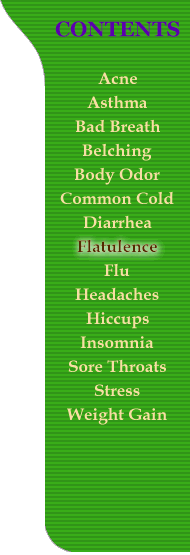|
For stand-up comedians, the subject o flatulence is sure to generate lots
of snickering, giggles and guffaws. But for those who suffer from this
distressing - not to mention embarrassing problem, it's no laughing matter.
Everyone passes a certain amount of flatus or "breaks wind," as we delicately describe it. Normally, from 400 to 2,000 milliliters of oxygen, nitrogen, carbon dioxide, hydrogen, and methane are expelled each day from the anus. Most of the time, this happens without inviting notice through sound or smell. But under some circumstances and in some people, indigested food products pass from the small intestine into the large intestine (colon), where the mass is fermented by large amounts of bacteria that are normally present there. The benign bugs of the colon are not choosy. Whatever comes their way goes right on their menu. It is the bacterially produced gas that gives flatus its characteristic odor when expelled. If you are a stoic or a recluse, you may simply be able to ignore that gaseous excess and its audible effects. If you're neither, there are some things you can do to prevent or relieve flatulence. Here's how: Eat to beat it. Carbohydrates may be problematic for some people. But before you cut out nutritious carbohydrates, try eliminating simple carbohydrated - those refined sugars like frctose and sucrose and white flour foods that may taste good byt are not bery good for you, especially if you have a flaulence problem. Minimize mild consumption. Milk, the so called perfect food does cause gas for some people. Some people din't have enough of the enzyme lactase in their gut or intestine to digest the milk sugar lactose. Drinking skim milk and buttermilk instead won't solve the problem either; the lactose is in the nonfat part. Add a little enzyme. If you are lactose intolerant but don't want to give up milk, you can try one of the over-the-counter products that contain lactase enzyme which helps to break down lactose. Be sure to follow the package directions carefully. Banish the offender. Some foods are known to be flatulogenics
or flatus producers. Doctors recommend giving up the most common ones and
then when you feel that the flatulence problem has been relieved, start
adding the foods back one by one. If yur body can tolerate small quantities,
you can gradually increase your intake.
|
 |
|
|
Gassers
People who suffer chronic flatulence may be able to control the problem by eliminating foods that increase fermentation activity, thereby producing gas. Here are some of the possible culprits: Extremely flatulogenic:
|
||